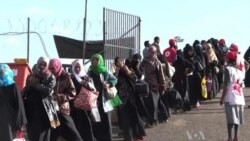ADDIS ABABA —
More than 135,000 Ethiopians have been deported from Saudi Arabia as illegal and undocumented workers. The returnees include many women who are unsure about what future awaits them in Ethiopia.
Of the 135,000 deported Ethiopians, 44,000 are women. Most of them worked in Saudi Arabia as domestic workers, earning up to $400 a month. A lot of that money was sent back to their family in Ethiopia. But they will not make half that amount working as domestic workers in Ethiopia.
The massive humanitarian airlift is challenging the Ethiopian government and humanitarian organizations, not only with providing post-arrival humanitarian assistance, but also with future opportunities.
“Now that I returned I can only go back to my family and help them with farming because I only have a little bit of money,” said Genet Said, a returning Ethiopian woman.
“My husband is in prison, so I can't say anything about my future,” said Seada Ayele, another returning Ethiopian woman.
Assisting returnees
After landing in the Ethiopian capital, Addis Ababa, the returnees are registered, given $47 and sent back to their home region by bus. While some return with luggage and savings, the International Organization of Migration [IOM] says others return empty handed.
“IOM provides also shoes for those who came barefoot. IOM also provides a meal for those who stay at the transit centers. Water and energy biscuits would also be provided,” said Alemaya Seifeselassie with IOM.
Those who arrive in the evening or can’t find their luggage stay overnight in one of the many transit centers set up around the city. Here they are fed and are assisted by the International Rescue Committee, which provides basic necessities, such as dignity kits that include sanitary pads, clean underwear and soap.
“For other needs that women might have, for example, if there are pregnant women, we refer them to the health center. And if there are women who need counseling support, we refer them to the counselors,” said Kidist Mekonnen of the International Rescue Committee.
But after the initial assistance, it is unclear where these women can find support or well-paying jobs.
“When I was abroad, I was the one who was helping my family. But now there is no one to help us,” said Workeh Laila, a returning Ethiopian woman.
Ethiopia’s government is expecting another 30,000 Ethiopians to return from Saudi Arabia within the coming weeks.
Of the 135,000 deported Ethiopians, 44,000 are women. Most of them worked in Saudi Arabia as domestic workers, earning up to $400 a month. A lot of that money was sent back to their family in Ethiopia. But they will not make half that amount working as domestic workers in Ethiopia.
The massive humanitarian airlift is challenging the Ethiopian government and humanitarian organizations, not only with providing post-arrival humanitarian assistance, but also with future opportunities.
“Now that I returned I can only go back to my family and help them with farming because I only have a little bit of money,” said Genet Said, a returning Ethiopian woman.
“My husband is in prison, so I can't say anything about my future,” said Seada Ayele, another returning Ethiopian woman.
Assisting returnees
After landing in the Ethiopian capital, Addis Ababa, the returnees are registered, given $47 and sent back to their home region by bus. While some return with luggage and savings, the International Organization of Migration [IOM] says others return empty handed.
“IOM provides also shoes for those who came barefoot. IOM also provides a meal for those who stay at the transit centers. Water and energy biscuits would also be provided,” said Alemaya Seifeselassie with IOM.
Those who arrive in the evening or can’t find their luggage stay overnight in one of the many transit centers set up around the city. Here they are fed and are assisted by the International Rescue Committee, which provides basic necessities, such as dignity kits that include sanitary pads, clean underwear and soap.
“For other needs that women might have, for example, if there are pregnant women, we refer them to the health center. And if there are women who need counseling support, we refer them to the counselors,” said Kidist Mekonnen of the International Rescue Committee.
But after the initial assistance, it is unclear where these women can find support or well-paying jobs.
“When I was abroad, I was the one who was helping my family. But now there is no one to help us,” said Workeh Laila, a returning Ethiopian woman.
Ethiopia’s government is expecting another 30,000 Ethiopians to return from Saudi Arabia within the coming weeks.









